Spanish is a cross-national and global language. It is the second language of the United States, and the first language of over 400 million people in Latin America, Europe, and Africa.
Department of Hispanic Studies Mission Statement
Spanish is a cross-national and global language. It is the second language of the United States, and the first language of over 400 million people in Latin America, Europe, and Africa. It is a vehicle for myriad cultural expressions that find audiences far beyond its traditional trans-Atlantic axis to Asia and the Pacific, and it has given voice to struggles for social justice that have echoed around the world.
The Department of Hispanic Studies at Bates College responds to the cultural richness and diversity of the peoples who speak Spanish as well as to the obligations and opportunities of a globalized world through a threefold mission:
- we enable students to acquire a strong and useful proficiency in Spanish that allows them to navigate cultural spaces in which over 500 million people interact worldwide.
- we foster the development of interpretative skills and contextual knowledge to engage critically a broad range of cultural productions originating in the Spanish-speaking world.
- we contribute to the study of the humanities through a curriculum of courses taught in Spanish that includes studies of Latin American, Spanish, and US/Latino literature, media and visual arts covering an array of historical periods, and is informed by diverse and varied theoretical approaches.
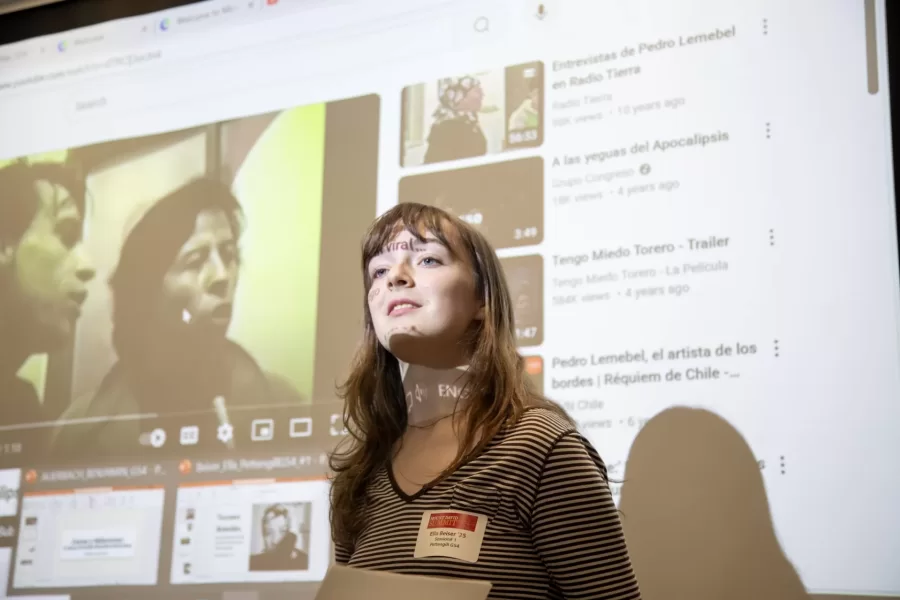
Ella Beiser ’25 presents her Hispanic Studies thesis on the work of queer Chilean activist Pedro Lemebel during the Hispanic Studies Panel.
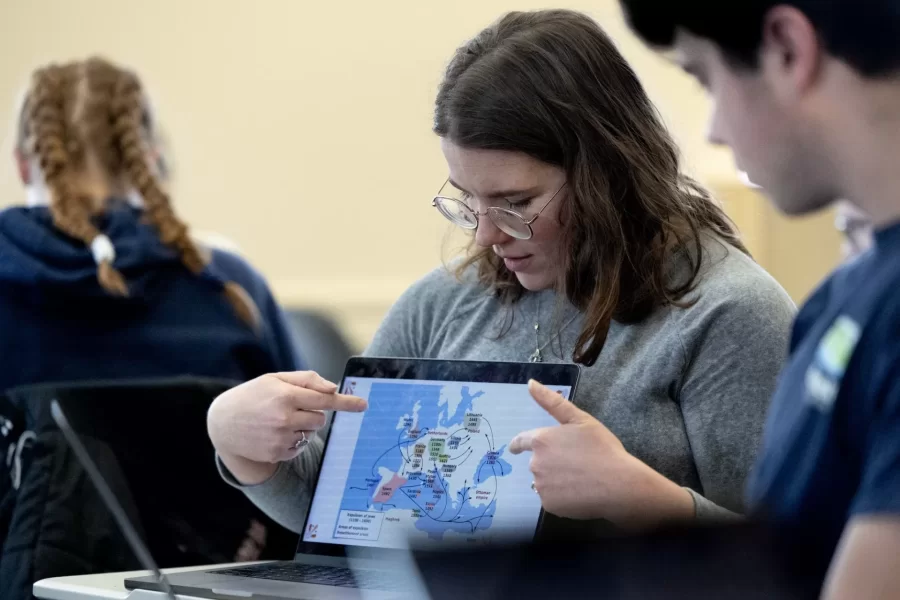
Students in Associate Professor of Hispanic Studies Stephanie Pridgeon’s “Screening Citizenship: Jewish Latin American Film” class prepare for two upcoming presentations they will make at the upcoming
Maine Jewish Film Festival, both in Portland and Bates. One film is called “Torah Tropical” (see below) and the other, made in Argentina and Austria, is called “The Klezmer Project).
Pridgeon says:
This coming Tuesday, March 4 at 7 PM in Olin, we will be screening the beautiful documentary “Torah Tropical” followed by a Q + A with producer Heidi Paster (parent of a current Bates student) led by students from my Jewish Latin American film seminar. The documentary follows the story of a family in Cali, Colombia, who converts to Judaism and attempts to immigrate to Israel. Please join us if you’re interested and please also consider passing along the information to your students, colleagues, and friends if they might also be interested (entry is free for Bates staff, faculty, and students!)
This course considers films from throughout Latin America made by Jewish directors. Students learn the history of Latin American film production as well as terms and skills necessary for audiovisual analysis. The course examines the ways in which film is used as a vehicle to explore and represent issues of identity, belonging, immigration, and assimilation that have long characterized Jewish experiences in Latin America. Moreover, the course focuses on filmmakers’ engagement with key social and political issues within their respective countries as well as on a regional or global scale. Taught in Spanish. Recommended background: HISP 228. Prerequisite(s): HISP 210 or 211.
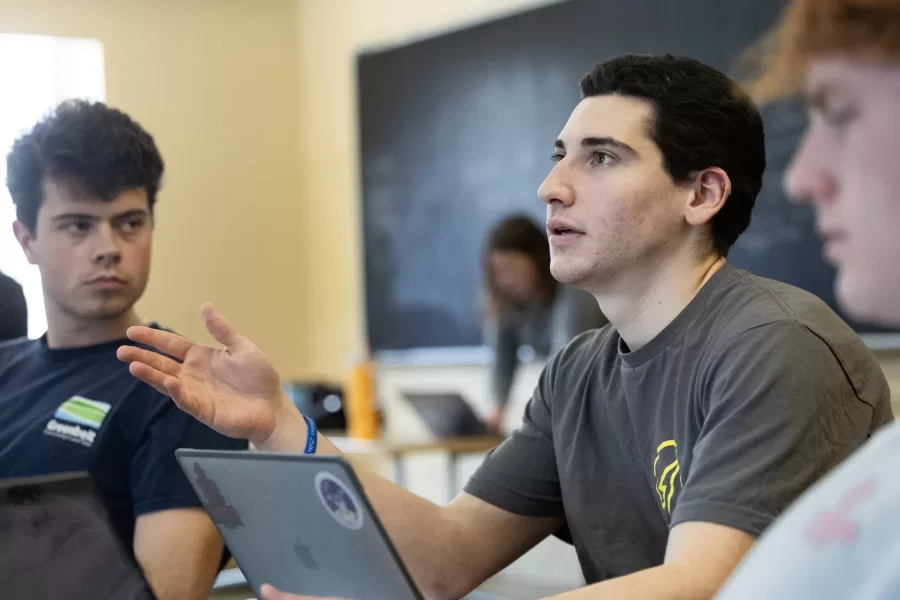
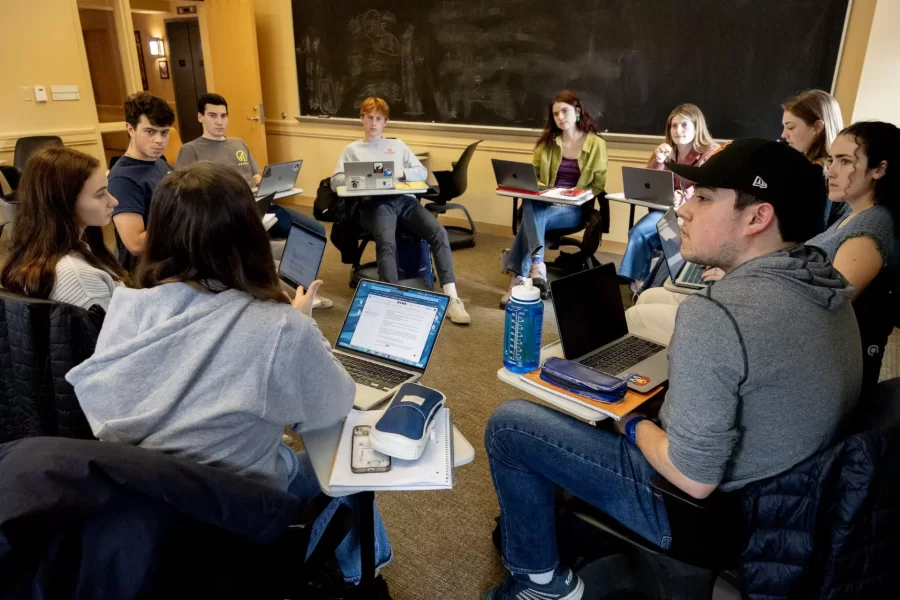
Students in Associate Professor of Hispanic Studies Stephanie Pridgeon’s “Screening Citizenship: Jewish Latin American Film” class prepare for two upcoming presentations they will make at the upcoming
Maine Jewish Film Festival, both in Portland and Bates. One film is called “Torah Tropical” (see below) and the other, made in Argentina and Austria, is called “The Klezmer Project).
Pridgeon says:
This coming Tuesday, March 4 at 7 PM in Olin, we will be screening the beautiful documentary “Torah Tropical” followed by a Q + A with producer Heidi Paster (parent of a current Bates student) led by students from my Jewish Latin American film seminar. The documentary follows the story of a family in Cali, Colombia, who converts to Judaism and attempts to immigrate to Israel. Please join us if you’re interested and please also consider passing along the information to your students, colleagues, and friends if they might also be interested (entry is free for Bates staff, faculty, and students!)
This course considers films from throughout Latin America made by Jewish directors. Students learn the history of Latin American film production as well as terms and skills necessary for audiovisual analysis. The course examines the ways in which film is used as a vehicle to explore and represent issues of identity, belonging, immigration, and assimilation that have long characterized Jewish experiences in Latin America. Moreover, the course focuses on filmmakers’ engagement with key social and political issues within their respective countries as well as on a regional or global scale. Taught in Spanish. Recommended background: HISP 228. Prerequisite(s): HISP 210 or 211.
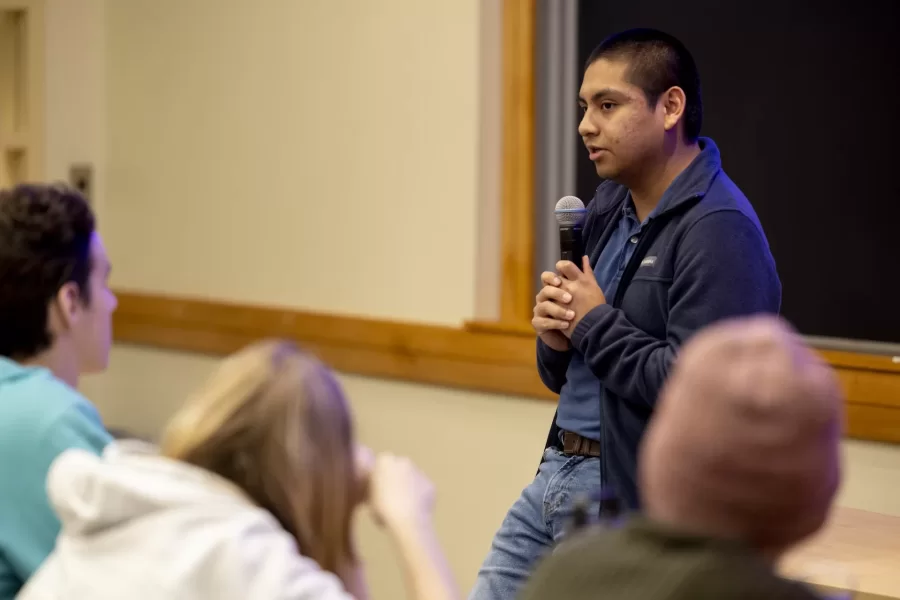
The Right to Live with One’s Parents vs U.S. Immigration Policy of Family Separation
Screening and discussion. U.S. immigration policies enforce family separation. Several million U.S. citizen children have at least one undocumented parent and are part of mixed-status families. Even though they are entitled to the same rights and freedoms as all Americans, many of these children are growing up with the constant fear of separation from their parents. The workshop features a showing of Abrazos (Embraces), a film by Guatemalan director Luis Argueta, about the experience of 14 U.S. citizen children, sons and daughters of unauthorized immigrants in this country, who travel from Minnesota to Guatemala to meet their grandparents, and in some cases, their siblings, for the first time. Luis Argueta will answer questions at the end. Led by: Baltasar Fra-Molinero, Professor of Hispanic Studies.
Location: Pettengill G65 |
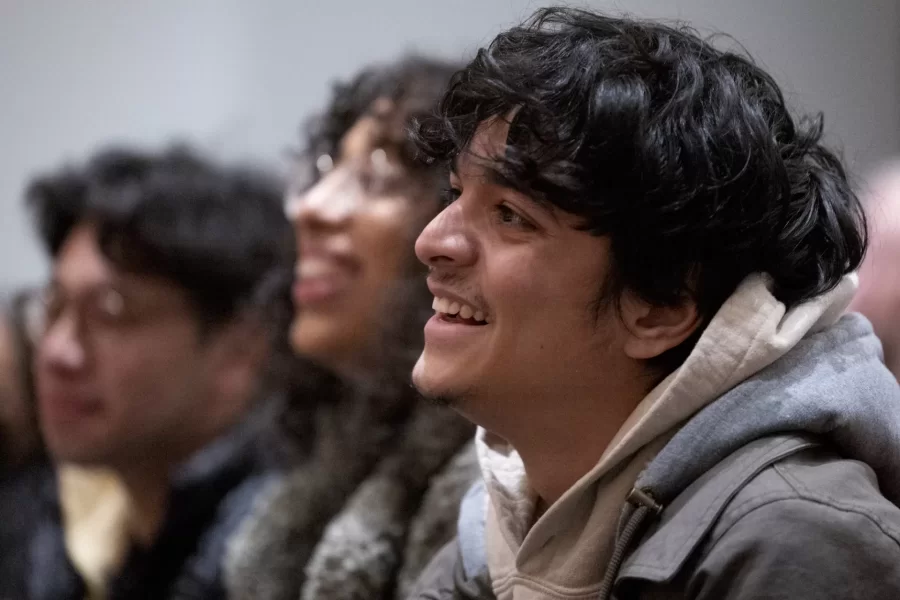
2pm | All These Sons
Screening and discussion. Chicago’s West and South sides are infamous for their high murder rates. In this documentary directed by Bing Liu and Joshua Altman, Marshall Hatch Jr. ’10 and Billy Moore (who served 20 years in prison for murder) create healing spaces for young men to reimagine themselves, find redemption, and embrace causes worth fighting for. Hatch, the subject of a cover story by Bates Magazine in 2021, will introduce the film. (2021; 88 min.) Sponsored by the Program in American Studies, Department of Anthropology, Department of Hispanic Studies, and Department of Rhetoric, Film, and Screen Studies.
Location: Olin Concert Hall
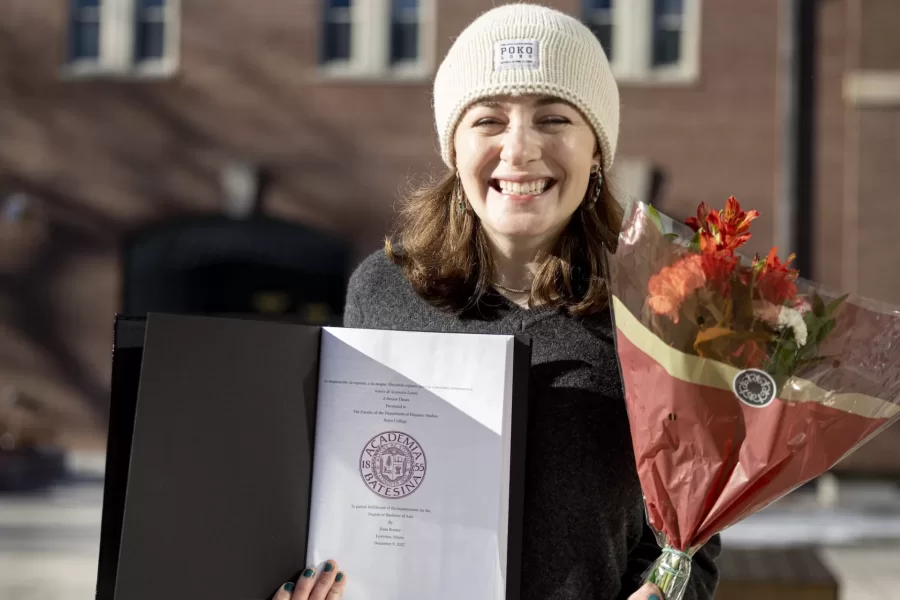
Ilana Rosker ’23 of Lexington,Mass.,(hat), a major in Hispanic Studies, and Emma Pike ’23 of York, Maine, a major in Hispanic studies, bind their theses in the company of friends on the Library Terrace on Dec. 13, 2022.
Rosker wrote on “La imagination, la rapture y la magia: Hacienda espacio para la conciencia alternativa a traves de la poesia Latin X.”
Pike wrote on “Llimpia bus propoios Platos!: explorando masculinidad hegemonica en Jane the Virgin.”
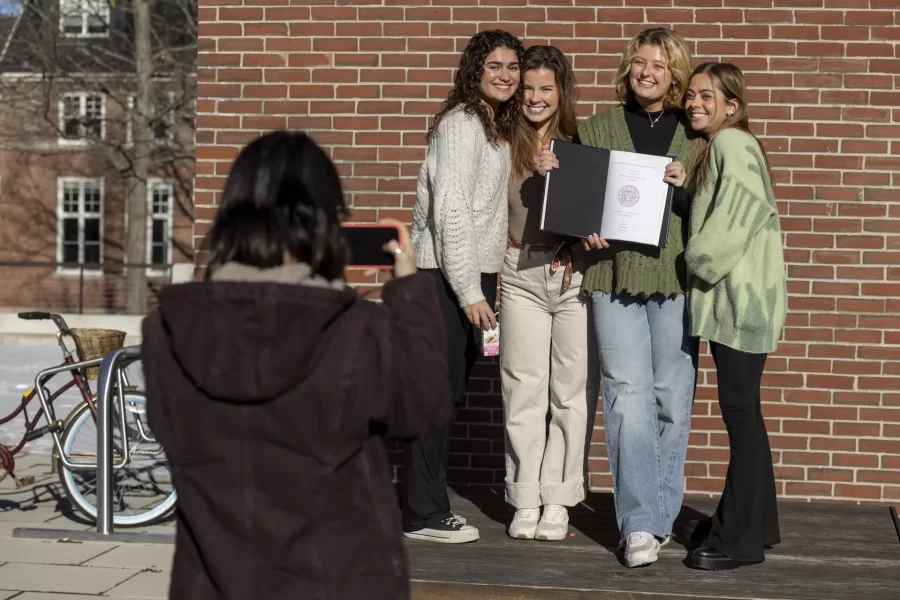
Ilana Rosker ’23 of Lexington,Mass.,(hat), a major in Hispanic Studies, and Emma Pike ’23 of York, Maine, a major in Hispanic studies, bind their theses in the company of friends on the Library Terrace on Dec. 13, 2022.
Rosker wrote on “La imagination, la rapture y la magia: Hacienda espacio para la conciencia alternativa a traves de la poesia Latin X.”
Pike wrote on “Llimpia bus propoios Platos!: explorando masculinidad hegemonica en Jane the Virgin.”
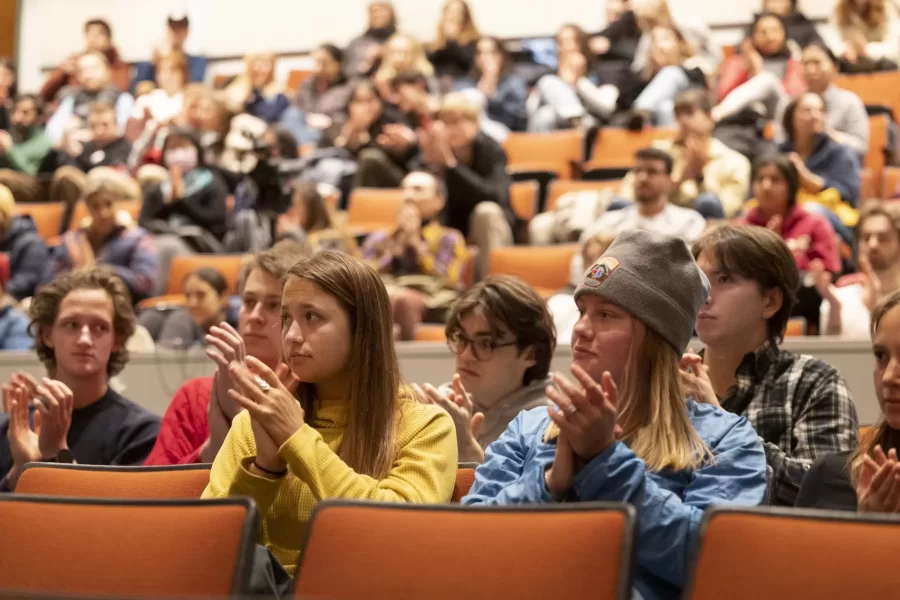
2pm | All These Sons
Screening and discussion. Chicago’s West and South sides are infamous for their high murder rates. In this documentary directed by Bing Liu and Joshua Altman, Marshall Hatch Jr. ’10 and Billy Moore (who served 20 years in prison for murder) create healing spaces for young men to reimagine themselves, find redemption, and embrace causes worth fighting for. Hatch, the subject of a cover story by Bates Magazine in 2021, will introduce the film. (2021; 88 min.) Sponsored by the Program in American Studies, Department of Anthropology, Department of Hispanic Studies, and Department of Rhetoric, Film, and Screen Studies.
Location: Olin Concert Hall








